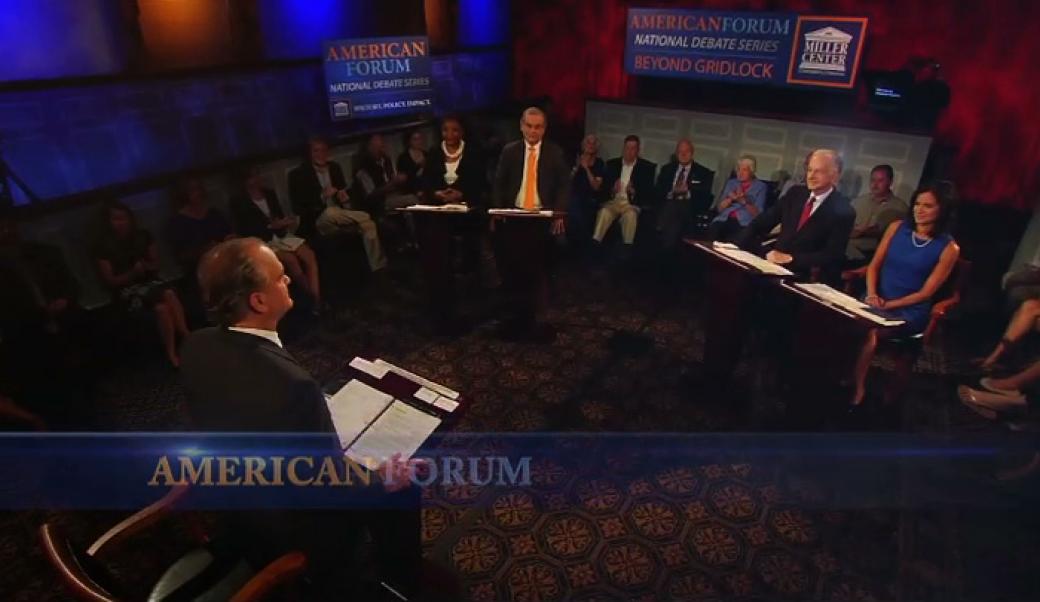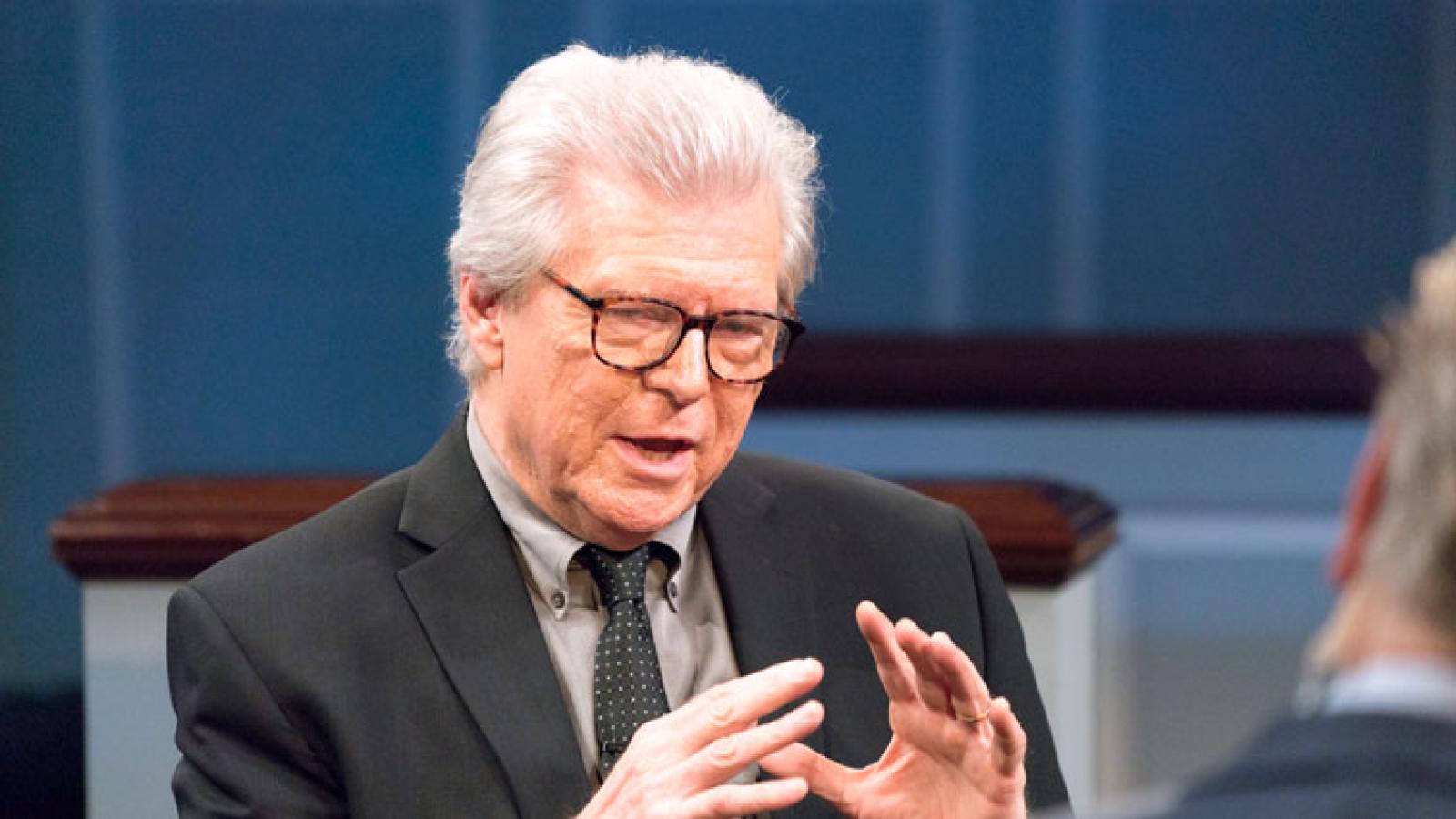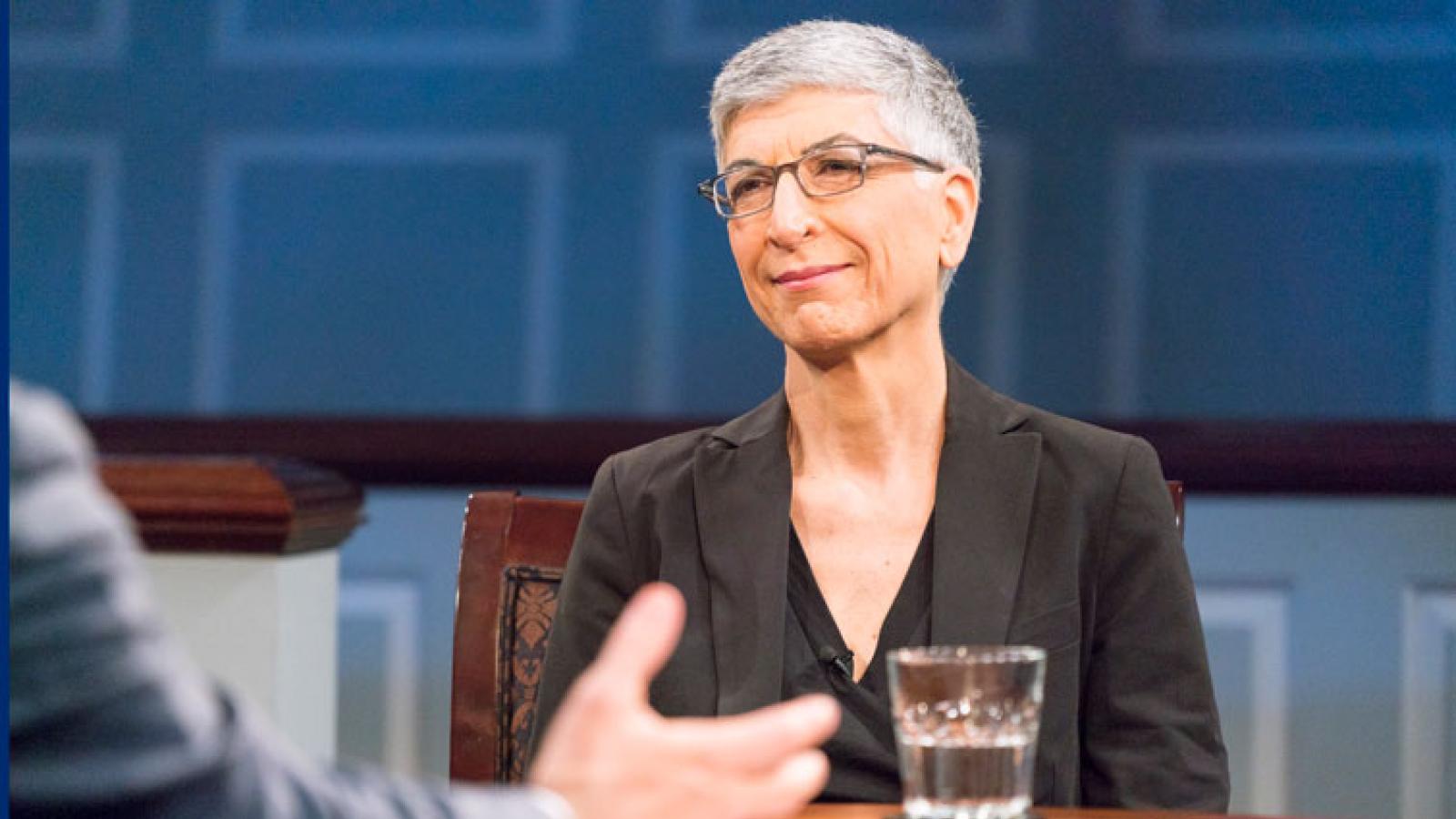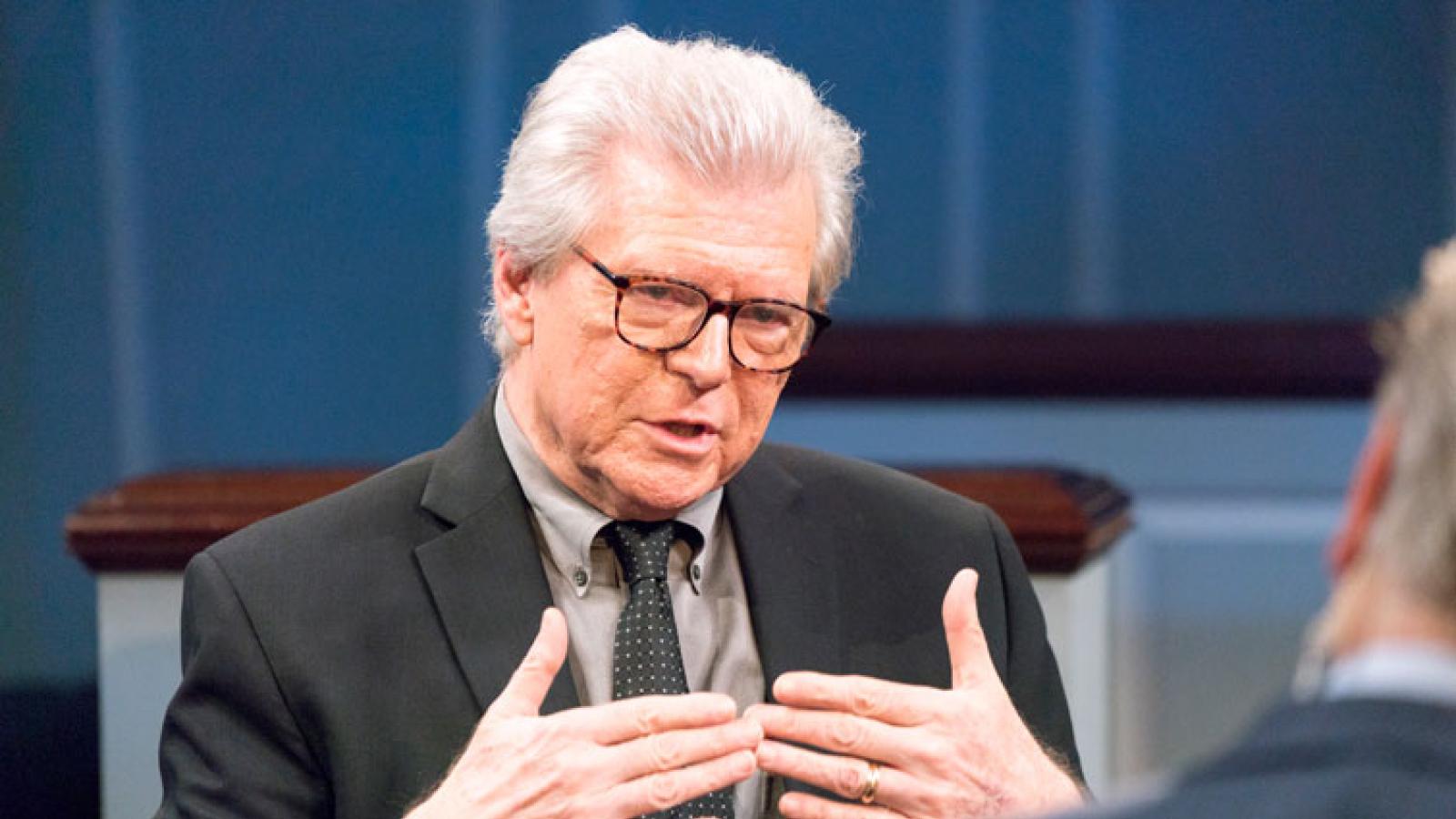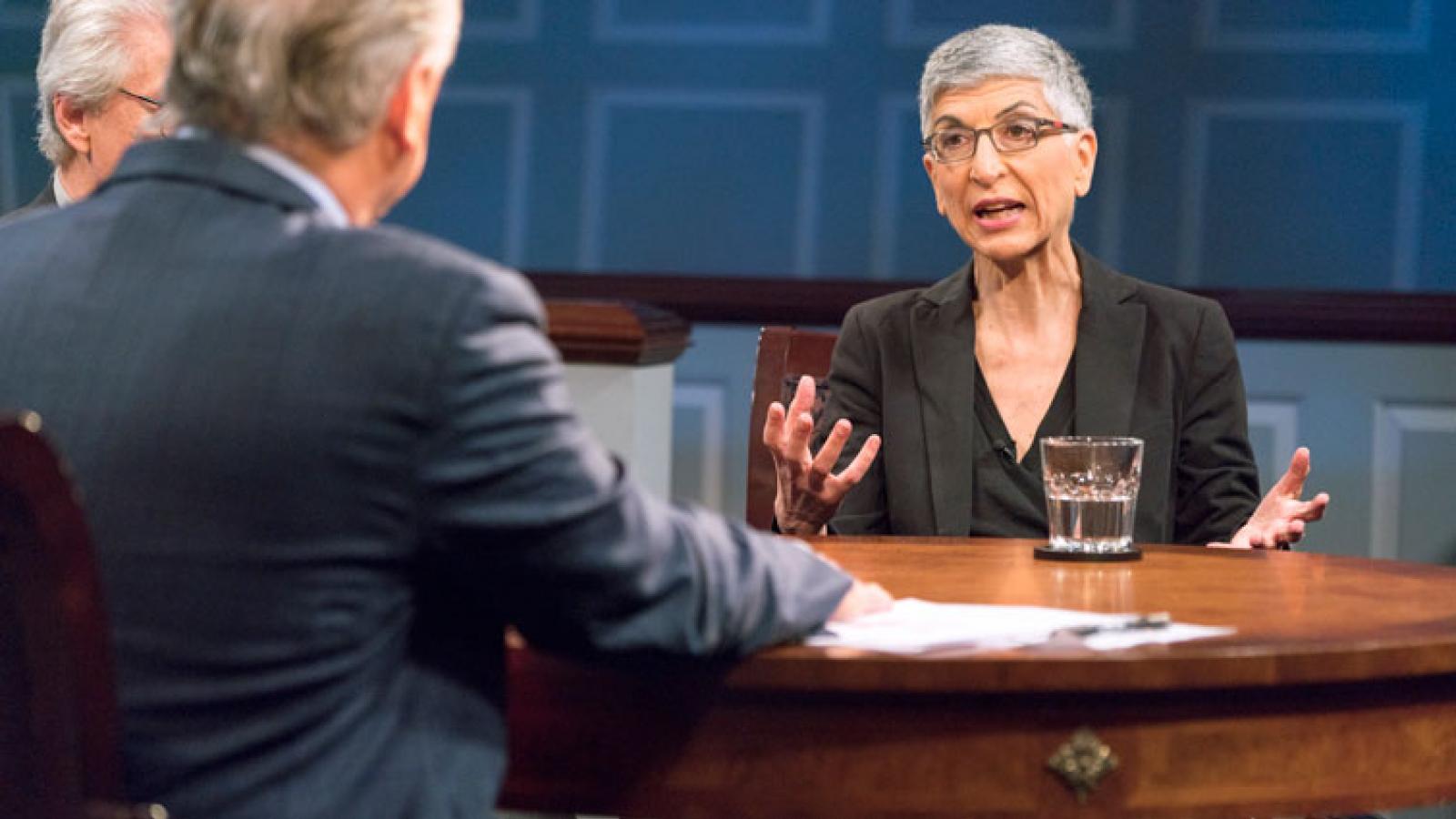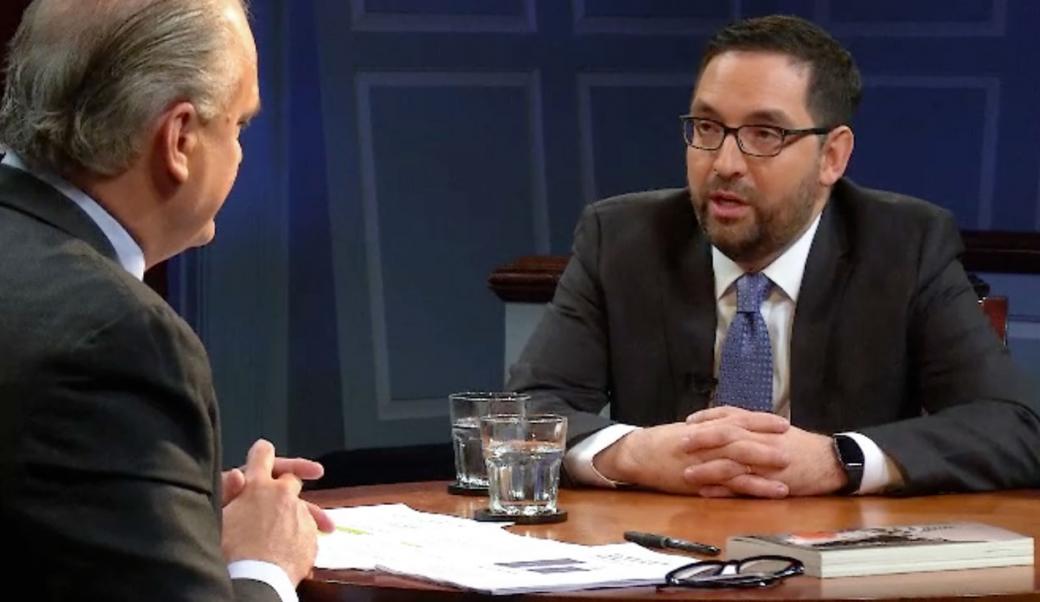About this episode
February 19, 2017
Tamar Jacoby and Gary Freeman
American Forum continues its focus on the first year of the Trump presidency, with a deep look into immigration and a search for common ground. The issue is polarizing. For some, the image of immigrants coming to the U.S. today is one of violence. But how much of the angst is valid, and how much of it is just anxiety? Our guests today are two long-time thinkers on immigration. Both approach the issue from a conservative perspective, but in important ways come to very different conclusions. Tamar Jacoby is president and CEO of ImmigrationWorks USA, representing small business owners around the country. Gary Freeman teaches government and specializes in the politics of immigration at the University of Texas.
Immigration
First Year 2017: Building a wall—what's really possible
Transcript
Douglas Blackmon: Welcome back to American Forum. I’m Doug Blackmon. A lot of words could be used to describe these first weeks of the Trump administration. Depending on your point of view, you might say amazing, scary, surprising, even unprecedented. On the issue of immigration and how some have reacted to President Trump’s first moves, we would all agree on one adjective: holy cow. From a declaration that the U.S. was moving to build a massive, hundreds of miles long wall on the Mexican border to a spat with the president of Mexico to a controversial executive order refusing refugees from certain countries to the expected policy proposals on deportations and sanctuary cities, President Trump’s decisions on the future of immigration policy may change the way we have long looked at that phrase on the Statue of Liberty: “Give me your tired, your poor, your huddled masses yearning to breathe free.” With this episode, American Forum continues its focus on the first year of the Trump presidency, with a deep look into immigration and the question: can we find any common ground? The issue is polarizing. For many, the image of immigrants coming to the U.S. today is one of violence and criminality. Usurping jobs of legal American citizens. Soaking up government benefits. But how much of the angst over these issues is valid, and how much of it is just anxiety? And what about the issue of jobs? Without immigrants, who’s going to do the work that Americans may not be willing to do? Our guests today are two long-time thinkers on immigration. Both approach the issue from a conservative perspective, but in important ways come to very different conclusions. Tamar Jacoby is president and CEO of ImmigrationWorks USA, representing small business owners around the country. Gary Freeman teaches government and specializes in the politics of immigration at the University of Texas. Thanks for both being here.
Jacoby: Good to be here.
2:41 Blackmon: Let’s start with the wall. President Trump wants to build a wall. Lot of people—yeah, certainly liberals and Democrats say that’s a terrible idea, maybe even an immoral idea. Lot of conservatives say that it won’t work. You know, or they acknowledge that maybe it won’t work. It costs a lot of money. But there’s nothing wrong with a country controlling its border, though. It’s just a bottom line thing. Isn’t that the case? And don’t—doesn’t pretty much every developed country in the world have a fence on the borders that it wants to control?
FACTOID: 51 border barriers built since World War II, half between 2000 and 2014
Jacoby: Yeah, Donald Trump is right about one big, important thing, and that—that’s the change that I think we agree on. Immigration policy has to be in American interests. Yes, rights are important. Yes, you want to treat people decently. But we have to think about our policy. What’s good for America. And yes, all countries think national sovereignty matters. And Americans clearly, after many years of a big surge of immigration, want more control, want more sovereignty.
The question is, is Donald Trump going about it the right way? And is the wall going to accomplish what he wants? And is it the most—the best way to accomplish it? I think probably not.
3:45 Blackmon: But do you see that the same way, Gary?
Freeman: Not quite, because I think that the wall and Trump’s promise to build a wall was absolutely key to his nomination in the Republican Party and then becoming the president. It really roused people. There was a tremendous response to that first speech he made, when he referred to criminals and what-all. And while you can think that he overstated, that it was rash, that it was impertinent and unhelpful in a lot of ways, it certainly mobilized his base. And I think now, the issue of the wall is being misunderstood by people, because they are complaining, oh, the wall is not—you can’t build it in certain parts. Don’t need it, it’s too expensive. But it’s a very valuable commodity for the president as he tries to push through his agenda.
Jacoby: Physical barriers help in some places, but much more effective is our electronic means and more men and what kind of signals you send with how you process the people when we get here. And I’m sure Trump will do a lot of that, too. But the wall is not really the most effective way. I’m not one of those people that’s outraged by the wall. But it’s kind of an unnecessary insult to Mexico, and it’s going to cost a lot of money.
Freeman The wall has been fortified by all sorts of electronic and manpower and aircrafts and all of that. And it’s had some good effect.
FACTOID: Drones used in 2,100 border stops in 2015, up from 1,400 in 2012
The wall as a symbol for Trump is something very valuable. And it doesn’t really matter whether it works, is expensive, but—we waste a lot of money on a lot of things. It’s a symbol of our national character and identity, and I think it’s quite important to his base. And if he backed off, he’d be facing a tremendous disagreement, disappointment.
Jacoby: So, when you enter the U.S., we know who enters. Everybody who enters—documented, fingerprinted now. All kinds of things. Run through security checks. We have no idea who leaves. And that, Congress has been saying for a long time, would be the most—would be one of the most effective things we could do
Freeman: Well, I think the exit—entry-exit issue is very important, since about 40percent of undocumented workers in the country came in legally through the visa system in some way but never left.
6:00 Blackmon: And say that number again, 40 percent.
Freeman: About. I think—
Jacoby: [Yeah, we don’t know anymore?].
Freeman: —that’s what most people say it could be, more or less. We haven’t really made the effort to find out who’s leaving or not leaving. If we did that, that would really improve our situation a great deal.
Jacoby: We do register students now, so we know where students are. But the one piece we haven’t talked about—President Bush used to always say one of the best ways to get control of the border is to make sure we have legal ways for the people who are going to be coming and going to come. A guest worker program would actually be one of the best ways to get control of the border. Because if we have jobs here that Americans—for whatever reason, not enough Americans are doing, we need the foreign workers. The laws of supply and demand are drawing those workers. And we don’t have a good door for them to walk through, to use Donald Trump’s metaphor—then they’re going to be running over the border—and that one of the most effective ways to get control of the border is to have a reasonable, regulated, legal door. Donald Trump doesn’t like guest worker programs very much, either. And I would argue that they are a key piece of getting control of the border.
Freeman: Well, I don’t like guest worker programs. The reason is because they’ve been tried in many European countries in the second half of the twentieth century, and they failed in the sense that most of the migrants stayed or many of them stayed. They sent their families.
FACTOID: 1942 Bracero Program with Mexico helped wartime labor shortages
And they resulted in a very large and implanted population of persons who are not of origin—not of the same origin as the country they’re in. So, your Turks in Germany and so forth. A friend says there’s nothing more permanent than a temporary guest worker program. It’s just—they don’t work.
Jacoby: And it’s not actually true. There are a lot of countries in the world that have very effective guest worker programs. Mexico and Canada have a good agricultural guest worker program, and everybody goes home at the end of the year, because they want to come back the next year
7:51 Blackmon: But, so, now, am I right that if we boil it down to the simplest of what the two of you—and this is one of the places where you guys would diverge, I think—is that, Gary, your view is that it would make sense to just sort of stop major worker immigration into the country right now, kind of by whatever means. [Freeman: Right.] To just sort of put a hold on things and let the market within the country adapt to that. And your view is that—
Jacoby: Immigrants are good for America, including—
Blackmon: Yeah, but—but not every sing—not just anybody who wants to come.
Jacoby: No.
Blackmon: But some very specific immigrants.
Jacoby: Well, I think supply and demand is a good method. And, you know, I always say—I mean, immigrants are now 13 percent of the population. They’re 25 percent of the doctors, 25 percent of the nurses, 25 percent of the patents. I think all that’s good, and why would we want to shut—50 percent of the Ph.D. scientists. Why would we want to shut that off? That’s great for the country. We wouldn’t have our cell phones and our iPads. A third of the people in Silicon Valley in the dot-com boom were high-skilled immigrants. And we actually need some low-skilled immigrants, because in—back in 1960, half of the American-born people in the labor force had—were high school dropouts, and they wanted to do hard, physical work. Now it’s less than 10 percent. We still need some people to do hard work like that, and they actually create jobs for Americans.
9:07 Blackmon: [Tamar says?] sounds kind of logical, but what do say, Gary?
Freeman: The problem is that if you make the supply and demand argument that you’re making, it leaves out altogether the consideration of the effect of foreign populations moving into the United States on the cultural differences and on the development of minorities that many Americans view as troublesome. And so, I think the cultural conditions of immigration are as important—in my mind, more important than the economic need.
Jacoby: So, I totally disagree on the cultural piece. I think immigrants are what has made America great for more than 200 years. And it’s true that some of—some voters and some Americans are worried that maybe it’s happening too fast and there’s too much Spanish in my supermarket and that kind of thing. And we do have to address those fears. And, you know, we do have to make sure that the people who—that we’re not—that, you know, it’s not like everyone in the world who wants to come here can come. It has to be people who are, again, in our interest.
10:08 Blackmon: So, is part of the difference between the two of you here also a difference that I—that I detect in the big debate about whether we should be letting refugees in from Syria or in from Muslim countries—and it basically comes down to—that there are some people who are comfortable with the idea that, yes, some folks who come through are going to be problematic in one way or another. There may even be someone who immigrates who then gets caught—gets radicalized at a mosque and commits an act of sympathy terror with ISIS, whether they were trained by ISIS or not. But some people sort of have the view that the value of all this immigration is so great that a certain amount of conflict, you know, of unfortunate circumstance is okay. Other folks have a view that, no, if there’s any of that, we really shouldn’t have any of these—
Jacoby: That’s not my argument. [Blackmon: That—that—that’s not—] That’s not my argument.
Blackmon: That’s not the division here.
Jacoby: As any policeman will tell you, or any security guy, the best way to find the people you’re looking for is actually to look for the people you’re looking for, as opposed to stopping everyone in a big crowd and looking at them.
Blackmon: Well, that’s not what Rudy Giuliani— [Jacoby: Prioritize—] —would say about racial profiling, unlike—
Jacoby: No, no, prioritized searches of some kind—and maybe by race. I mean, I’m not arguing that. But prioritizing, figure out what are the qualities of the people you’re looking for, and looking at them—
11:34 Blackmon: But I think I’m hearing that why—you disagreed with the way I said it a minute ago, but I think what I’m hearing is that—still does come down to that you’re saying that a sufficient system could be put in place that would work better than the one we’ve got now, and that would sufficiently eliminate the mistakes and allow in the opportunity. And you’re saying you just don’t really have faith that that system would ever work with that level of efficiency. And I think maybe you’re also saying even if it does, these are jobs and places that ought to be occupied by Americans.
Jacoby: He doesn’t want all the other people either, yeah.
Freeman: Well, I—I think you’re right in characterizing me as believing that there’s not a lot of interest in—in the American government, in the American elites, in controlling immigration. They prefer—I mean, they love immigrants. They—many of them are immigrants. And there’s a lot to be said for immigrants. I—I would be the first to admit that. But many people are simply hysterical President Trump is willing to do what he said he was going to do. And it was clumsy, it was rushed, all—you know, it was—embarrassment, and every time you think Trump does something that you might applaud, he does two things that you have to forget about. But—so—so, I’m not a—advocate of the Trump view, but he said, “I’m going to do this.” He got elected, and now that he’s doing it, a lot of people—who simply aren’t willing to raise their hand and argue for a tightly controlled immigration system—
FACTOID: Trump executive order blocked immigrants from seven Muslim nations
Jacoby: So, I am—
Freeman: —are raising Cain, yeah.
Jacoby: —I am for a controlled immigration system. I think we need very effective border answers. I’d like to see effective border answers, as opposed to not effective border answers. I think we need workforce enforcement. E-Verify is—really good idea. We should have E-Verify. Employers who hire people should be able to run the people through a system and figure out if they’re legal or not. We definitely need enforcement. It’s a key part of the answer. But we also—I don’t think that should mean not letting people in. I think we should be an open country, welcoming country, and it should be determined by what’s good for us.
13:49 Blackmon: There is another range of views out there, beyond yours, that might sound a lot like yours, in some respects. A lot of the things you’re saying—you know, the being welcoming—
Jacoby: To my left.
Blackmon: To your left, exactly.
Jacoby: That person.
Blackmon: That—the—and to your left, there’s a sort of extension of this sort of practical recognition of the value of—particularly high-skilled workers and such. But to your left you’ve got folks who are saying, no, if we get into this incremental business, then we’ll just do things that are helpful to businesspeople like you but will never actually solve what they see as big moral issues and—
Jacoby: So, I don’t like to see myself as just a representative of business in this. I’m thinking about what’s good for America, right? But I recruited those businesspeople because they could argue for immigration in America’s interest. But the difference between me and this person over here is that this person over here—the biggest difference is that they’re basing their arguments on immigrants’ rights as opposed to starting from the national interest. I’m not saying they’re against the national interest, but they start with the immigrants’ rights. Again, I think rights are important—
Blackmon: Just human dignity and human rights, right.
Jacoby: I think rights are important, and that—that’s got to be part of the equation, but that’s not where I start. And so, that’s the biggest difference between me and this person. And I think there is, among some of these—this—some of these people a suspicion of enforcement, which I don’t have. I think enforcement is a key part of the answer. And I don’t think there’s any confusion. I mean, I—or any contradiction between good enforcement and channels that allow a reasonable flow.
Freeman: Nobody really seems to ask or is able to ask: do we need a million new immigrants every year? And they’re coming in primarily through the family programs. So, if they have relatives here, then it’s easier to get in. We have long waiting lists to come to America because the visa program gives them the expectation that they will be able to come once everybody else has gotten through. And so, I think Senator Sessions once said on the floor of the Senate, we need to look at legal immigration, too, at that—the legal part of our program, not just undocumented workers. And the New York Times, the next day, called him a virulent racist for simply asking the question: do we really need, or—let someone defend the case that we need a million workers.
16:06 Blackmon: It’s interesting that in this last election—that, as both off you, I think, would agree, that anxiety about immigrants and immigration represented—both by everything about the wall—but also just more generally as far as the sense—sense of cultural anxiety—certainly— [Jacoby: Sure.] was a big part of the equation of this election. But what most Americans, I think, don’t fully grasp is that if they live in a place where the Hispanic population has had very high, by percentage growth—the majority of that growth has probably come from the existing legal or, perhaps, illegal population that is there—but that there’s more growth in— [Jacoby: Absolutely.] —within the population that’s already here than there is from people who are coming across the border. I mean, I was looking at some numbers. The—one could argue that the—one could sort of say why are we all this—all that worried about this, because, you know, the total number of illegal residents in the country peaked ten years ago or thereabouts at around, you know—approaching 13 million, and we’re now—in 2014, we’re at 11.1 million. Pretty steady decline. I mean, that’s still a big number, but one could argue: isn’t this taking care of itself? And with the removals and deportations of the Obama and Bush years—and they were—2015, we’re up to—Obama administration removed 330,000—333,000 people. And if you look over the whole period of that presidency, we’re looking at quite a few million people. And so, you could stop all immigration and still have a pretty robust young population of people from—you know, partly from—just this—what has now become an indigenous, diverse population? On the flipside, what is your answer to the idea that—that actually, that’s still not enough. I guess that’s what you might say, that—wouldn’t you—
Jacoby: Well, I would say—look at, you know, the high-tech companies that say, “We can’t fill jobs.” Look at the construction contractors who say—already again today—you know, for a long time after the downturn, they weren’t building houses in America. They’re starting to say, “We could be bidding on 10 and 20 percent more work, but we don’t have the workers.” You know? I mean, it just depends—people—
18:17 Blackmon: Do you buy that, that there—that’s—that there—a lack of workers is actually constraining economic activity?
Freeman: No, I do not. The problem is, in Germany and Britain and so forth—and I see Europe as—at—further down the road, but we’re on our way, because we have the same arguments, the same policies, in a way. Germany is losing its native population, partly because they don’t have as many children, but partly because Germans are leaving Germany.
FACTOID: Germany took 885,000 immigrants in 2014, largest in European Union
Europeans as a whole are wondering how did we get into this mess? And the way we got into it was by governments bringing in immigrants without explaining it to the public, without discussing the possible impact, and maybe not even understanding that—what was going on. But what’s going on is an enormous, sweeping change of the American society, and then a policy or situation in which people were not able to raise this issue without being labeled, as I’m sure I will be, a racist. And I don’t think that’s fair, and—
19:22 Blackmon: Does that sound racist to you?
Jacoby: So, I haven’t said racist. I haven’t used— [Blackmon: But—] —the word racist at all morning.
Blackmon: Does it sound that way to you?
Jacoby: I disagree about whether cultural vitality is good for America, and—but there—certainly a lot of Americans who think that—who are scared of—and people are scared of change, of course. And that’s reasonable, and if that’s true, you know, we have to work harder on making the change smoother for people
19:43 Blackmon: Gary, for you, I mean, I cited that—you know, that line from the poem that’s at the Statue of Liberty. [Freeman: Yeah.] Is part of what you’re saying that, you know, that we have to kind of move beyond—that perhaps that is now a naïve or dated idea, and it’s time for America to not fool itself with—that that’s really a part of our national ethos?
Freeman: Very much. I—first of all, the poem was not written for the Statue of Liberty. It was put there later, and it’s a—not a very good poem, I would say. But who cares about that.
FACTOID: The New Colossus was written to raise money for statue’s pedestal
The fact is that we were admitting immigrants at the turn of the century, the nineteenth, twentieth century, in very large numbers. It’s the first time we had had large numbers in a long time. And after just a few years of that very high migration, we stopped, passed two very unpopular—among the intellectuals, very unpopular bills, the National Origins Acts in ’21 and ’24. And then, there was a long period of almost no immigration, running from about 1920 to 1965. And in ’65, a law was passed with little debate and very little understanding that has been used by whoever’s in—interested in using it to support mass immigration, year after year, growing bigger and bigger and bigger. And never justified other than, well, we need more workers. Well, we’ve got a million new ones every year, and it doesn’t seem to be enough. And, of course, that’s only the green card holders. There—all the temporary workers and one thing or the other. So, we have this uncontrolled—I’d say deliberately uncontrolled flow of migration. And you have to ask who benefits from that.
21:43 Blackmon: But does that also suggest—I mean, is there a separate issue of the economic interests of the United States, economic interests of workers here, the situation you were just describing—is that separate from do we have a human obligation when there’s a holocaust about to happen, is there a human obligation on our part to say, yes, we’ll take large numbers of this population of people who are at grave risk? Would you view—I mean, that’s back to the Statue of Liberty.
Jacoby: That’s— [Freeman: Rights] —that’s the rights argument.
Blackmon: Yeah. But so, is that a—but what would you say to that? Is there a—argument for refugees that just ignores economic interest?
Freeman: Yes, I think so, in a situation where large populations are at peril of sudden death or whatever.
22:28 Blackmon: So, DREAMers, do the DREAMers need to—does—should President Trump take a—aggressive posture on so-called DREAMers and actually just say, no, they got to go?
FACTOID: 750,000 “DREAMers” were brought to U.S. illegally as children
Freeman: No, I think that—first of all, their entry to the U.S. was different in character than typical—
FACTOID: “DREAMers” have social security numbers and second-year work permits
Blackmon: There’s a compassion argument, yeah.
Freeman: There is.
Blackmon: And you both would agree with that, I think.
Jacoby: And American interest argument.
Freeman: Yeah, that’s right.
Jacoby: They’re going to be good for us.
Freeman: I would grant that, as well.
22:48 Blackmon: Okay, so, a quick review. You both agree that there’s nothing immoral about building a wall. But you both have doubts about its effectiveness and whether it’s worth the cost. Guest workers, you split on that. I think you somewhat agree on—that the entry/exit system—
Jacoby: Let’s call it labor migration.
Blackmon: Labor migration. But the entry/exits, doing a better job of knowing who’s in the country and making sure they leave on time, you both agree on that. The cultural conflicts and these—the culture issues, not at all. You’re in very different places. DREAMers, you’re somewhat in the same spot. But, so, Gary, if you were on the phone with President Trump tomorrow and he said, “Okay, tell me”—you know, you got”— [Freeman: Right.] —“you got thirty seconds or less. Tell me what—am I on the right track? Wrong track? What should I be doing?” What’s your advice to President Trump?
Freeman: I would say he’s hit on some very key issues in—American national interest. That has not played very well in the literature or the research on immigration or the debate. So, national interest. Is this good for Americans, as opposed to is it good for the migrants or people—poor people out there? You can be sympathetic for them, you can do—adopt policies that assist them. But I do not think we should go headlong into an embrace of the millions that are clamoring into Europe now when we have our own problems here and when the—absolutely necessary consequence of that is long-term transformation of American society. If you want to transform American society, fine. Keep them—keep the migrants coming.
Jacoby: So, I say, “President Trump, you’re totally, 100 percent right: immigration should be driven by American interest. Not by rights, not by what the Mexicans want. American interest. You’re 100 percent right, we need to reassert sovereignty. People have a sense that the—we can’t—we’re out of control, that there’s no border—(coughs) excuse me. We need to fix that. Sovereignty is good. What you don’t—apparently—I’m not sure you understand, President Trump, is that legal immigration is really good for America. And it needs to be regulated, it needs to be controlled, we need to think about what’s in our interest. The legal immigration has to be in our interest. But don’t throw out the baby with the bathwater.
Blackmon: Well, watch your Twitter accounts tonight. We’ll see which of you President Trump endorses (laughter) late— [Jacoby: Ouch.] —in the evening. Tamar Jacoby, Gary Freeman, thank you both for being here. We hope you will join us for future editions of American Forum, where our focus is always on the presidency. You can watch us on your local PBS affiliate, or to join our ongoing conversation, look for us on the Miller Center Facebook page. Visit millercenter.org or follow us on Twitter. I’m Doug Blackmon. See you next week.
